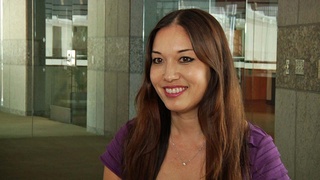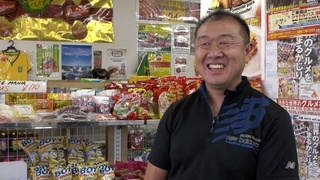Interviews
Change in sense of Nikkei Brazilian identity over time (Portuguese)
(Portuguese) Well, with regard to the meaning and importance of the term Nikkei, I think that personally, within my life, I would single out two moments. Two or even three moments let’s say. The first was when I entered college. There, in college, you end up having a greater consciousness of the fact that you have to become a part of society as a whole, and that you have to in effect be a Brazilian, right.
And I started college in sixty-eight, in the history program, and that was a very important period in Brazil, and throughout the world, which was the period of the student movement. And so there you had that thing, that preoccupation with wanting to be Brazilian. And you end up in conflict because in spite of wanting to be Brazilian, you have this Japanese face, and you’re always being reminded of it. So, that was a very important moment for trying to understand these two sides.
And then, in the seventies, beginning of the eighties, when I started working as a journalist for a Nippo-Brazilian paper. It was a daily paper, with a lot of pages, and just one page in Portuguese, which was precisely a page that I did. And later on I worked for other papers, always ones focused on people of Japanese descent, talking about our community, about culture, etcetera. So, that was a very important moment in terms of Nikkei, in the sense of you in effect having the responsibility, as someone who works in the media, being responsible for relating news that is as close to the truth as possible.
And the third moment then was in ninety-eight when I came to serve as director of the Museum of Japanese Immigration. Which is another responsibility because suddenly you’re in charge of preserving the memory of those Japanese immigrants. I have no idea in fifty years, or a hundred years, what will remain of the memory of our parents and grandparents. So, I think those were three very important moments, and the issue of Nikkei has always been at the center of my life.
Date: October 7, 2005
Location: California, US
Interviewer: Ann Kaneko
Contributed by: Watase Media Arts Center, Japanese American National Museum.
Explore More Videos


Postwar school-life
(b. 1930) Half Japanese and grew up in both Japan and the United States.

On Challenging Institutions
(1938-2020) Japanese American attorney and civil rights activist

Pop and Balls
(1938-2020) Japanese American attorney and civil rights activist


Re-examining Identity
(1941-2018) Japanese Canadian photojournalist and activist

Fitting in to both sides of her family
Jewish Japanese American journalist




Conflicted about immigrating to America (Japanese)
(b. 1925) War bride

Defining "Nikkei"
(1941-2018) Japanese Canadian photojournalist and activist

The difference between Nikkei community in Oizumi and Brazil (Japanese)
(b. 1979) Sansei Nikkei Brazilian who lives in Oizumi-machi in Gunma prefecture. He runs his own design studio.

The term Nikkei (Japanese)
(b. 1979) Sansei Nikkei Brazilian who lives in Oizumi-machi in Gunma prefecture. He runs his own design studio.

Advantages of living in Japan (Portuguese)
(b. 1962) Japanese Brazilian owner of a Brazilian products store in Japan.
